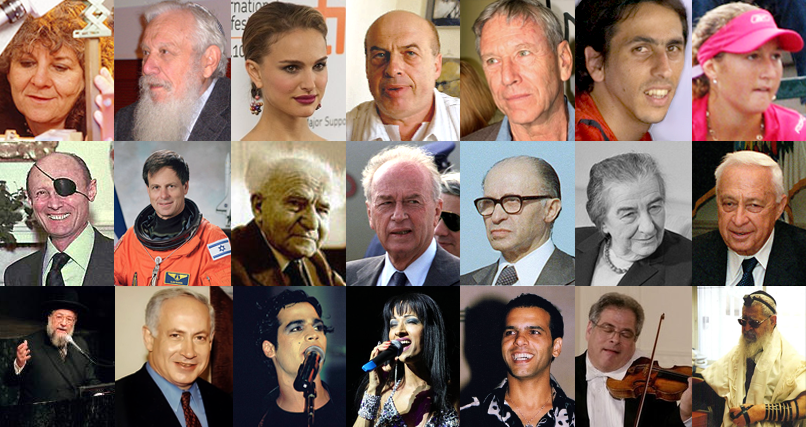The secular-religious divide in Israel is driving this election cycle and is the one critical thing to know about modern Israel

Copyright: A derivative work by TheCuriousGnome, from a variety of images creditted above. [CC BY-SA 3.0 (https://creativecommons.org/licenses/by-sa/3.0)]
I can very easily have friends who are devout Catholics, Buddhists, or Hindus, but I, a secular Jew and Israeli, cannot really have friends who are devout Jews in the religious sense. If you think about this statement as fact, it may go a long way to explain what is at the core of the secular-religious divide in Israel. Don’t misunderstand me; I love religious Jews as I love all Jews and as I hope they love me. But our lifestyles are so radically different, our reference points so divergent in everything from world history to literature to art to cuisine that there is simply no overlap; outside of Israeli politics we simply have nothing to talk about and even the political discussions are fraught with unusual tension.
I cannot invite religious Jews to dinner, because my kitchen is not Kosher. Even if I have no pork or shellfish, even if everything in my refrigerator has been purchased in a kosher supermarket, I still do not observe separation between meet and dairy in my cupboard or in my sink and thus no dish in my house is safe to eat from for even the least observant of all observant Jews. The most I can offer them is a piece of fruit on a disposable paper plate and something to drink from a disposable cup. But that doesn’t really alleviate my anxiety. Is the art on my walls too erotic? Are the books in my library sinful by inclusion (too many foreign and secular titles?) and by omission (no volumes of the Talmud, no treatises on the Halachah).
I take a bite and remember, when I see my guest mumbling to himself that I totally forgot the blessing we say before eating. I am asked if I can produce a pitcher of water. But there is already a perfectly good one on the table. Ah, right, for the ritual washing of hands, I think to myself. Another demerit. An awkward silence. I am racking my brains for stories to tell, going through the vast database of stories we tell our guests. But they all, suddenly, involve eating oysters in pork sauce or pork in oyster sauce on the Sabbath while escaping Israel for the high holidays to spend them abroad. I am, for once, speechless.
Perhaps we can talk about our long and painful history, I’m thinking to myself. Surely there must be some common ground there. I venture that in the first century BC and first century AD there were many people in Judea who claimed to have been miracle workers, bringing rain and healing the sick and that Jesus could be seen in that light, no matter how painful were the actions of his followers in later centuries. I give the example of Honi ha-M’agel and am met with outrage. Honi was a saint and Jesus was the devil, my guest says. I feel guilty for having brought this up and even guiltier for having a more nuanced view of the historical Jesus than my interlocutor; after all, my ancestors were all religious Jews just like he is now and they were slaughtered by Christians for their beliefs just like his were.
Two thirds of Israeli Jews do not observe the Sabbath; we drive to the beaches and to the malls, we go to restaurants and eat mussels and shrimp with and without pork sauce. The other two thirds do no such thing. They go to synagogues and study the Torah, in both the written and the oral traditions. They, I feel, are the original; we, the imitation.
Politically, some religious Jews tend to treat the state of Israel as any non-Jewish state and live in Eretz Israel the same way they lived in exile. Others consider it God’s work, a holy enterprise, the beginning of the end of the bimillennial exile. The latter sometimes have an abundance of messianic fervor, trying to influence Israeli government to abandon caution in its dealings with the Arabs and the world at large and trust in the Almighty. This is were their non-historicity comes into play because we have tried this once before shortly after Jesus, with not one, but two disastrous revolts against Rome that gave us nearly two millennia of exile and introduced the world to the word “Palestine”.
If Israel is to survive, we do not have to visit each other, but we have to live together as Jews, Jews who respect their respective twin contributions to the present. A present that has half of the world Jews living free lives in their own homeland and the other half staying in exile by choice, secure in the knowledge that should they ever need to leave in a hurry, there is one place on the face of this planet that will never turn them away. Without religion there would have been no Jews, but without the sometimes militant secularism of the Zionist movement with its embrace of the Jewish nation and its utter rejection of messianism in favor of ruthless pragmatism, there would be no Israel. Both halves were needed and are still needed to complete the three-part harmony that is Judaism: the nation, the land, and the Torah. Let’s make sure we never forget this fact.
- Trump Bashes Fed’s Williams, Says US Economic Growth “No Thanks To Federal Reserve”, Sees “No Inflation”
- A Quiet Hotel On The Edge Of Sprawling Frankfurt Airport Allows Visitor A Chance To Revisit One Of The Important Sites Of The Cold War


